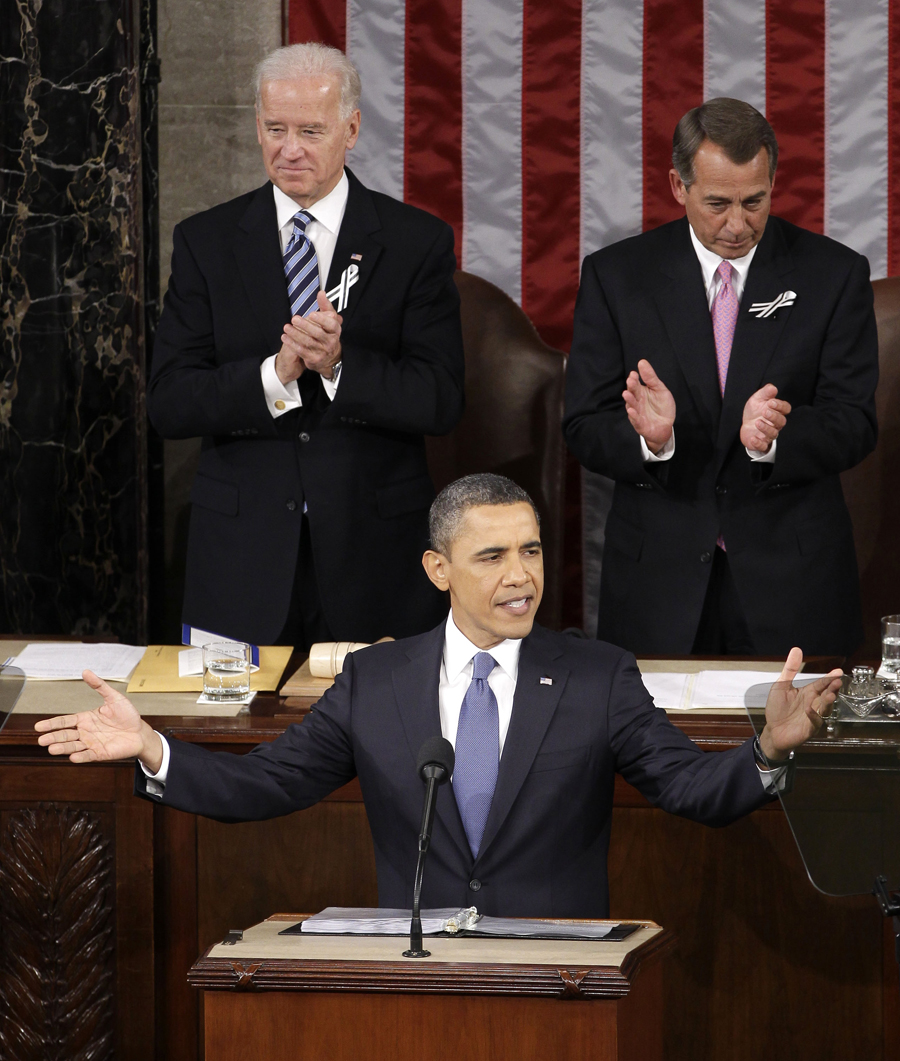The unemployment rate in the United States is 9.4 percent. But if you went to President Barack Obama’s State of the Union address on Tuesday night looking for a job, you came away empty. The president did not even mention the word “unemployment.” The stock market “has come roaring back,” he told America, and “corporate profits are up.” But aside from one reference to “the shuttered windows of once booming factories, and the vacant storefronts of once busy Main Streets,” Obama devoted precious little time to the current plight of Americans who might be facing foreclosure or the expiration of their unemployment benefits. Instead he told us that the “worst of the recession is over” and “that we had broken the back of the recession.”
That might well be true, so why not accentuate the positive, even it does sound an awful lot like “mission accomplished”? To be fair, Obama’s decision not to emphasize pain and suffering is totally understandable. The reality of the current situation is that even if there were obvious, affordable, short-term measures that could goose job creation in the U.S., House Republicans would surely shoot them down. The next two years are about playing defense, not offense. So put away any pretense at Clintonian wonkery, and let’s go for a Reaganesque parade of optimism!
It’s a smart move. Obama could have made a big issue of Republican intransigence, but that would have been a strategic error. If the next two years are going to be about gridlock, then the side that occupies the center comes out looking best in 2012. Fully aware of this, the president took a road so high in his speech that any attempt to evaluate it in terms of the practical economic policy initiatives we can expect over the next two years got utterly lost in the stratosphere. We heard a lot about grand goals that everyone can get behind — reinvigorating education, reinvesting in infrastructure, remaking the tax code –but are going to be fiendishly hard to execute. Especially when you consider that the president also called for a four-year budget freeze on discretionary spending.
Come on — the numbers just won’t work. If you’re going to cut $400 billion over the next five years, then the cash that you’re going to have available to invest in high-speed rail, or biomedical research or clean energy — all great things, name-checked with relish by Obama — is just going to be too small to make a difference.
I thought Obama’s most effective passage was his quick summary of the changes wrought by globalization and technology:
The rules have changed. In a single generation, revolutions in technology have transformed the way we live, work and do business. Steel mills that once needed 1,000 workers can now do the same work with 100. Today, just about any company can set up shop, hire workers, and sell their products wherever there’s an Internet connection.
Meanwhile, nations like China and India realized that with some changes of their own, they could compete in this new world. And so they started educating their children earlier and longer, with greater emphasis on math and science. They’re investing in research and new technologies. Just recently, China became home to the world’s largest private solar research facility, and the world’s fastest computer.
This is all true. We are all facing a more competitive landscape and we do desperately need the investments in exactly the areas the president set forth if we want to thrive in the future. But thriving in the future is not the same as world domination, and the president lost me with his constant reiteration of the mantra “win the future” — as if, as with the competing immortal swordsmen of “Highlander,” “in the end, there can be only one.”
That’s nonsense, and it betrays a distressingly parochial view of how the global economy could and should work. We should be looking forward to greater prosperity in China and India, because richer consumers there entail larger markets for our own goods. Trade does not have to be a zero-sum game — properly organized, everyone should come out a winner. American innovations spread all over the world — the innovations to come from China and India will improve our lives as well.
But the rhetoric probably plays well with the home crowd. Americans like to feel exceptional, like they’re the best, and if they don’t feel special, they’ll find someone to take their frustrations out on. The person in the White House is the an obvious target. So President Obama better hope that not only is the worst of the recession really over, but that the economy continues to get healthier, and quickly. Because if unemployment is still over 9 percent in November 2012, he’s going to find it a lot harder to float above it all then he did in January 2011.

